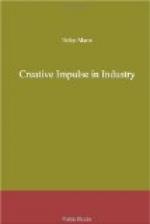Nor is there ground for the hope that in time institutions and relationships will be regulated on principles of altruism. It is not apparent indeed that such regulations would yield even the present allowance of happiness incident to our own immature method of capturing what wealth we can without relation to social factors. As unfortunate as we are in pursuit of that blind method, it is safe to predict that the world would be a madder place than it is to-day if every one devoted himself to doing what he believed was for the good of everybody else.
The hope of social revolutionists that private business would overreach itself and defeat its own purpose, grew out of the expectation that its tribute exactions would draw the subjects of capital together in a common defensive movement; that the movement on account of its numbers would overturn business and that in place of private management democratic control would be instituted. Some such outcome, sooner or later, seems inevitable if civilization is scheduled to advance. The labor union movement, unlike the political socialist revolutionary movement, undertakes in its operation to supply labor with a certain working content, which the administrative scheme of industry has excluded from the experience of its workers. But this content is not sufficient to stimulate the imagination of the trade unionists with the thought that the world of industry is the field of creative adventure. Their conception born of experience is not so flattering. It would be a brave man who would undertake to convince the twentieth century adult wage earner, involved in modern methods of machine production, that his poverty is less in his possession of wealth than in his growth and in his creative opportunity.
The industrial changes which the labor movement proposes to make are on the side of a better distribution of goods. A better distribution would have a dynamic significance in wealth production, if the actual increase which labor secured in wages and leisure were a real increase. But exploiting capital provides for such exigencies as high wages by increasing the price of products, thus reducing the wage earners’ purchasing power to the former level. High wages fail to disturb the relative portion of capital and labor even more than they fail to affect the purchasing power of the worker.
It is often suggested that if the state assumed control of industry the blight of business could be removed. But in the transfer we would not necessarily gain opportunity to enjoy the adventure which industry holds out. Industry as a creative experience, it is safe to predict, would be as rare a personal experience and as foreign an influence in social existence under state management as it is under business management. The state would curb the amount of wealth exploitation possibly, but would not alter the universal attitude toward wealth production, which is to take as much and give as little as one can get off with.




